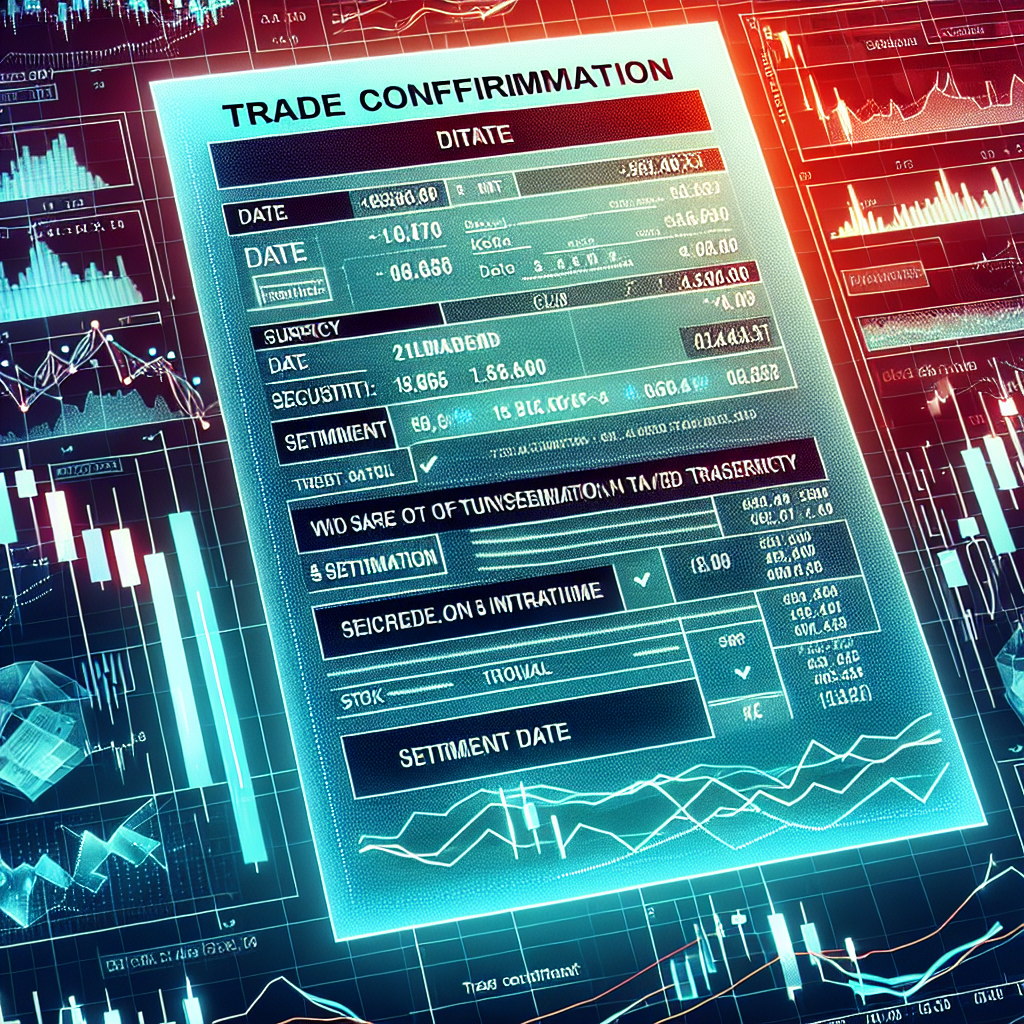What Is a Trade Confirmation? Why It’s Important

Have you ever wondered, "What is a trade confirmation" and why it's an essential aspect of trading? As a trader, whether you are dealing with stocks, futures, or commodities, ensuring the accuracy of your transactions is crucial. This is where the trade confirmation comes into play. Essentially, a trade confirmation acts as a receipt for your trades, providing you with all the relevant details of the transaction. It guarantees that your trades are accurately recorded, thus preventing potential disputes or confusion down the road. In essence, it is more than just a formality; it is a vital document for your trading activities.
In today’s fast-paced trading environment, understanding trade confirmations is more important than ever. The complexities of finance necessitate an accurate recording of transactions, especially with the growing importance of digital trading platforms. Brokers and financial institutions rely on these confirmations to ensure their clients’ trades are reflected accurately in their brokerage statements. Accurate trade records also are pivotal during tax season, ensuring traders have all the required information. It’s also crucial to protect against potential trading errors that can be costly if not handled swiftly.
What Is a Trade Confirmation?
A trade confirmation is a document provided by a broker detailing the specifics of a trade. It typically includes information such as the date of the trade, the settlement date, the price, the amount of security or contracts, and any associated fees. Essentially, it serves as the final step in the process of executing a trade, ensuring that both parties, the trader and the broker, are on the same page about the transaction details.

Trade Confirmation is More Than a Receipt
While it might seem like a simple receipt, a trade confirmation is far more significant in the trading world. It serves as proof of the transaction, ensuring transparency between the trader and the brokerage. Unlike a typical purchase receipt, a trade confirmation can include intricate details that help in further analysis and decision-making for future investments. With this document, traders can affirm key aspects of their trade, which can bolster their confidence and foresight in the market.
Trade Confirmation vs. Affirmation
It's essential to distinguish between trade confirmation and trade affirmation. Both these processes ensure the accuracy of a trade; however, trade affirmation happens before the trade is finalized. During affirmation, details are verified and can be corrected if discrepancies are found. In contrast, trade confirmation comes after the trade is executed. Understanding this distinction clarifies potential confusion, helping traders maintain accurate records and make informed decisions. For a glimpse of trading etiquette, explore trading rules with FFN that ensure you maintain accuracy in all your transactions by visiting this rules page.
The Role of a Master Confirmation Agreement
A Master Confirmation Agreement (MCA) plays a critical role in standardized trading practices. This agreement outlines the standardized terms under which all transactions of a particular type will occur between the two parties. It essentially reduces the need to renegotiate terms each time a trade is executed. For traders dealing with complex or high-volume trading, a master confirmation agreement ensures efficiency and consistency across trades. Moreover, it helps in aligning the expectations and responsibilities of all involved parties, thereby enhancing trust and reliability in trading partnerships.
How to Confirm a Trade with Your Broker
Confirming a trade with your broker involves a few critical steps. First, review the details sent to you in the initial trade confirmation. Check for discrepancies such as incorrect prices or quantities and report them immediately. Most brokers have a certain time frame in which you can confirm trading discrepancies. It’s always advisable to confirm trading details through the official channels prescribed by your broker. This ensures that any concerns raised are appropriately documented and addressed. Always maintain communication with your broker and ensure that any corrections are reflected in updated broker statements. A comprehensive understanding of the platforms supported by your brokerage further simplifies this process.
Why Trade Confirmations Matter
Trade confirmations stand as a critical layer of protection for traders, ensuring each trade is executed correctly and recorded accurately. They play several pivotal roles in the broader trading ecosystem.
Protect Yourself From Errors
Mistakes in trading can be costly, both in monetary terms and time spent rectifying them. Trade confirmations act as a fail-safe, offering traders a chance to verify transaction details. Missteps such as incorrect pricing, quantity, or the wrong security can be flagged and corrected if noticed promptly through trade affirmation. These confirmations serve as corroborative records, assuring all parties involved that the deal is truthfully and accurately processed. They are indispensable in maintaining the fidelity of trades and resolutions in case issues arise. Interested in expanding your trading knowledge? Educate yourself with timeless tips and strategies by exploring this resource.
Keep Accurate Broker Statements and Records
Accurate broker statements form the backbone of a trader's record-keeping system. By continuously validating trades through confirmations, traders ensure their brokerage statements reflect true market engagements, preventing potential complications with regulators or during audits. More importantly, accurate records help in the evaluation of trading strategies post trade settlement, providing insights into what strategies worked and what did not. It is also particularly beneficial during tax assessments, where accurate receipts and confirmations are crucial for compliance.
Real-World Examples for Futures Traders
Futures trading, with its inherent leverage and market dynamics, renders trade confirmations even more pivotal. Imagine a scenario where an oversight in a future trade confirmation goes unchecked. The financial implications could spiral due to the use of leverage, magnifying both potential losses and profits. Hence, futures traders must be especially diligent in scrutinizing their confirmations and ensuring alignment with their trading strategies and objectives. Proper documentation supports informed decision-making, catering to long-term trading success.
Final Thoughts on Trade Confirmations
Trade confirmations are indispensable tools in the world of trading, offering a layer of trust and accuracy to each transaction. Understanding what a trade confirmation entails and its critical importance can help safeguard your investments and refine your trading practices. From differentiating affirmation vs confirmation to leveraging a master confirmation agreement, each facet bolsters a trader's confidence and precision in the market.
Aspiring traders should emphasize consistent reviewing and confirming of their trades as a customary practice. It doesn’t just facilitate seamless post trade settlement but enforces a discipline that is invaluable in trading. Their strategic use ensures that traders are protected against errors while reflecting true trading intentions in their brokerage records. For those venturing into advancing their trading careers, understanding these nuances is crucial, offering you peace of mind and a stable foundation in trading.
Interested in elevating your trading knowledge? Explore some key aspects of opening trading accounts and how they complement effective trading strategies.
Ultimately, armed with knowledge about trade confirmations, traders can confidently navigate the complexities of trading while bolstering their trading strategy with each verified transaction.



